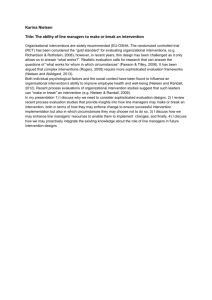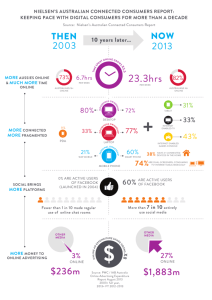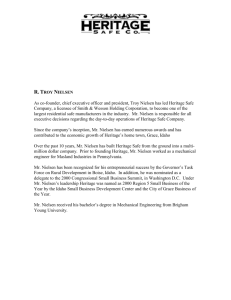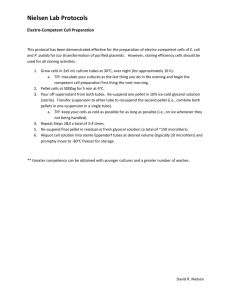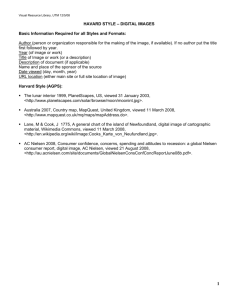STATISTIQUES MONDIALES SUR L'USAGE D'INTERNET
advertisement
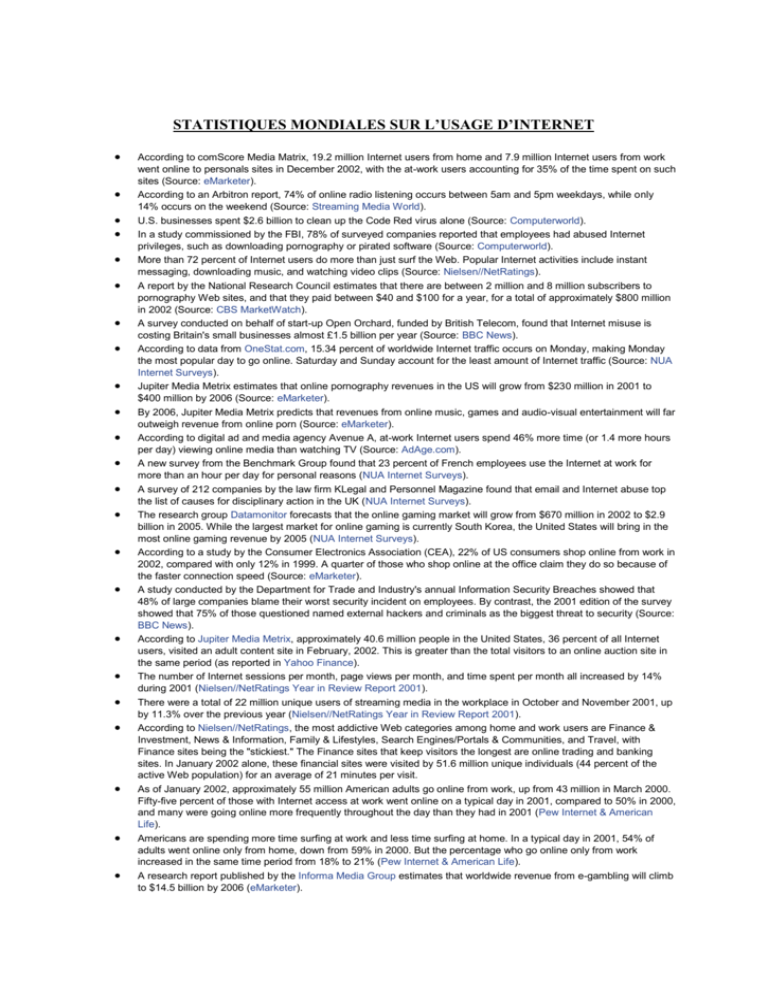
STATISTIQUES MONDIALES SUR L’USAGE D’INTERNET According to comScore Media Matrix, 19.2 million Internet users from home and 7.9 million Internet users from work went online to personals sites in December 2002, with the at-work users accounting for 35% of the time spent on such sites (Source: eMarketer). According to an Arbitron report, 74% of online radio listening occurs between 5am and 5pm weekdays, while only 14% occurs on the weekend (Source: Streaming Media World). U.S. businesses spent $2.6 billion to clean up the Code Red virus alone (Source: Computerworld). In a study commissioned by the FBI, 78% of surveyed companies reported that employees had abused Internet privileges, such as downloading pornography or pirated software (Source: Computerworld). More than 72 percent of Internet users do more than just surf the Web. Popular Internet activities include instant messaging, downloading music, and watching video clips (Source: Nielsen//NetRatings). A report by the National Research Council estimates that there are between 2 million and 8 million subscribers to pornography Web sites, and that they paid between $40 and $100 for a year, for a total of approximately $800 million in 2002 (Source: CBS MarketWatch). A survey conducted on behalf of start-up Open Orchard, funded by British Telecom, found that Internet misuse is costing Britain's small businesses almost £1.5 billion per year (Source: BBC News). According to data from OneStat.com, 15.34 percent of worldwide Internet traffic occurs on Monday, making Monday the most popular day to go online. Saturday and Sunday account for the least amount of Internet traffic (Source: NUA Internet Surveys). Jupiter Media Metrix estimates that online pornography revenues in the US will grow from $230 million in 2001 to $400 million by 2006 (Source: eMarketer). By 2006, Jupiter Media Metrix predicts that revenues from online music, games and audio-visual entertainment will far outweigh revenue from online porn (Source: eMarketer). According to digital ad and media agency Avenue A, at-work Internet users spend 46% more time (or 1.4 more hours per day) viewing online media than watching TV (Source: AdAge.com). A new survey from the Benchmark Group found that 23 percent of French employees use the Internet at work for more than an hour per day for personal reasons (NUA Internet Surveys). A survey of 212 companies by the law firm KLegal and Personnel Magazine found that email and Internet abuse top the list of causes for disciplinary action in the UK (NUA Internet Surveys). The research group Datamonitor forecasts that the online gaming market will grow from $670 million in 2002 to $2.9 billion in 2005. While the largest market for online gaming is currently South Korea, the United States will bring in the most online gaming revenue by 2005 (NUA Internet Surveys). According to a study by the Consumer Electronics Association (CEA), 22% of US consumers shop online from work in 2002, compared with only 12% in 1999. A quarter of those who shop online at the office claim they do so because of the faster connection speed (Source: eMarketer). A study conducted by the Department for Trade and Industry's annual Information Security Breaches showed that 48% of large companies blame their worst security incident on employees. By contrast, the 2001 edition of the survey showed that 75% of those questioned named external hackers and criminals as the biggest threat to security (Source: BBC News). According to Jupiter Media Metrix, approximately 40.6 million people in the United States, 36 percent of all Internet users, visited an adult content site in February, 2002. This is greater than the total visitors to an online auction site in the same period (as reported in Yahoo Finance). The number of Internet sessions per month, page views per month, and time spent per month all increased by 14% during 2001 (Nielsen//NetRatings Year in Review Report 2001). There were a total of 22 million unique users of streaming media in the workplace in October and November 2001, up by 11.3% over the previous year (Nielsen//NetRatings Year in Review Report 2001). According to Nielsen//NetRatings, the most addictive Web categories among home and work users are Finance & Investment, News & Information, Family & Lifestyles, Search Engines/Portals & Communities, and Travel, with Finance sites being the "stickiest." The Finance sites that keep visitors the longest are online trading and banking sites. In January 2002 alone, these financial sites were visited by 51.6 million unique individuals (44 percent of the active Web population) for an average of 21 minutes per visit. As of January 2002, approximately 55 million American adults go online from work, up from 43 million in March 2000. Fifty-five percent of those with Internet access at work went online on a typical day in 2001, compared to 50% in 2000, and many were going online more frequently throughout the day than they had in 2001 (Pew Internet & American Life). Americans are spending more time surfing at work and less time surfing at home. In a typical day in 2001, 54% of adults went online only from home, down from 59% in 2000. But the percentage who go online only from work increased in the same time period from 18% to 21% (Pew Internet & American Life). A research report published by the Informa Media Group estimates that worldwide revenue from e-gambling will climb to $14.5 billion by 2006 (eMarketer). A study by the Online Publishing Association found that at-work Internet users spend more time per day on the Internet than watching TV (34% vs. 30%). In 2001, 60.7% of employees surveyed said they visit Web sites or surf for personal use at work (up from 50.7% in 2000) (UCLA study on Internet/E-Mail use). The number one reason employees give for the Internet causing them to be being less productive at work is the time they spend surfing sites that are unrelated to work. (UCLA study on Internet/E-Mail use). Thirty-two percent of those who bought holiday gifts online in 2001 did at least some of their holiday shopping from work, up from 26% in 2000 (Pew Internet & American Life). According to a recent Jupiter Media Metrix report, the at-work usage of standalone media players in the US increased by 34.9% between January 2000 and January 2001, from 11.6 million to 15.7 million users. The No. 1 search term used at search engine sites is the word "sex," according to Alexa Research. Users searched for "sex" more than other terms such as "games," "travel," "music," "jokes," "cars," "weather," "health" and "jobs" combined. The study also found that "pornography/porno" was the fourth-most searched for subject. Secret monitoring by the U.S. Treasury Department of Internet use among Internal Revenue Service employees found that activities such as personal e-mail, online chats, shopping and checking personal finances and stocks accounted for 51 percent of employees' time spent online. The top non-work Web activity favored by IRS employees was going to financial sites. Chat and email ran a close second, followed by miscellaneous activities (which included visiting adult sites), search requests, and looking at or downloading streaming media (reported in the Chicago Tribune and Business 2.0). IWon was the domain most visited by at-work surfers, with an average of about 16 visits per at-work surfer per month, according to Nielsen//NetRatings data for January 2001. Surfers at this sweepstakes/portal, on average, looked at 210 pages and spent more than an hour and 40 minutes at the site during the month (reported in Business 2.0). Users of online auctioneer eBay Inc. at work spent 157 minutes at the site in January compared with 126 minutes while at home. Long a favorite among at-work surfers, eBay ranked 7th among the most-visited sites for at-work surfers. However, eBay ranks first in terms of average pages per person and time spent per month, at almost 300 pages and two hours per person. (Nielsen//NetRatings, as reported by Reuters and Business 2.0). Napster music swapping software was found on about 20% of over 15,000 work PCs examined (eMarketer.com) Internet streaming media is beginning to gush, and the market for servers capable of delivering video and audio will likely double between now and 2005, according to a study by the Cahners In-Stat group. (eMarketer.com) 28% of those who made gift purchases did so from their offices or cubicles (Pew Internet & American Life Project). 32% of those who have Internet access at work used the Internet while on the job to buy holiday gifts, while only 24% of Internet users as a whole purchased gifts online. This suggests that people are taking advantage of fast connections at work (Pew Internet & American Life Project). Workers spend an average of 21 hours online at the office vs. an average of 9.5 hours at home (Nielsen/Net Ratings). 70% of all Internet porn traffic occurs during the 9-to-5 workday (SexTracker). Employees earning $75,000 to $100,000 annually are twice as likely to download pornography at work than those earning less than $35,000 (eMarketer.com) 32.6% of workers have no specific objective when they surf the Internet (eMarketer.com). One in five men and one in eight women admitted using their work computers as their primary lifeline to access sexual explicit material online (MSNBC). 78% of Canadians with Internet access at work have used the Internet for personal reasons, and personal usage accounts for 26% of web surfing time at work (Source: Angus Reid) At-work use of the Internet closely matches home use. Of those who use the Internet both at work and at home, 45% say they send personal e-mail more often at work than at home, 33% say they read the daily news more often at work than at home, 31% gather local information more often at work than at home, 31% investigate travel arrangements more often at work than at home, 24% visit sites related to hobbies more often at work than at home, and 24% participate in contests and sweepstakes more often at work than at home (Jupiter Communications). Popular sites that are not always work-related attract many visitors during the work hours. Expedia.com gets 47% of its traffic during the workday, while Travelocity, MSNBC, iWon, and Weather.com reported receiving 46%, 42%, 42%, and 41% of their total visits during working hours (Jupiter Communications). In a survey of Internet sites, the majority reported that traffic to their site is heaviest during work hours. 14% reported that traffic was highest from 7am to 10am, 24% stated it was highest from 10 am to 2pm, 24% from 2pm to 5 pm, 20% from 5pm to 8pm, and 18% from 8pm to 7am (Jupiter Communications). The top pay-to-surf site, MyPoints.com, receives 37% of their traffic during the work day (Jupiter Communications). U.S. Internet users at work spend over twice as much time online as home surfers even though they make up less than half the cyber population, according to new data. (Nielsen//NetRatings, as reported by Reuters). News sites reached 35.5 percent more users at work than at home and work users also spent 68 percent longer online. (Nielsen//NetRatings, as reported by Reuters). Finance sites reached over 30 percent more work users who spent nearly double the amount of time -- an average of 33 minutes per month -- online than home users. (Nielsen//NetRatings, as reported by Reuters). The work user will keep closer tabs on the markets throughout the day while they're open. (Nielsen//NetRatings, as reported by Reuters). 36% more users at work surfed news and information sites than at home, spending 68% more time on them (Nielsen//Net Ratings). 31% more users at work surfed finance sites than at home, spending 102% more time on these sites (Nielsen//Net Ratings). Shopping sites reached 18% more Internet users within the workplace than at home (Nielsen//Net Ratings). CNNfn had four times the reach in the workplace than its reach to home users (Nielsen//Net Ratings). Work users went online on average 41 times a day, compared to 18 times a day among home users (Nielsen//Net Ratings). Web users at the office take advantage of high-speed connections to access broadband entertainment sites such as Broadcast.com and MP3 more frequently than at home (Nielsen//Net Ratings). Surfers access news, information and finance sites much more frequently during the workday than at night so that they can keep up with breaking news or the markets (Nielsen//Net Ratings). Online shopping is dominated by Amazon.com and eBay both at home and at the office. Only 5.7 million workers visit eBay, compared with 21.5 million for the most-visited site, Yahoo. But eBay visitors stay at the auction site the longest, almost three hours (Nielsen//Net Ratings). During work hours: 9% of employees earning under $35K surf the Net for a new job, while 11% of workers earning $75K to $100K do the same (Greenfield Online). Charles Schwab reveals that 72% of its customers plan to buy or sell mutual funds over the next six months, and 92% plan to do so online during work hours. 82% of U.S. business executives surveyed by the consulting firm Dataquest (a division of the Gartner Group) believe Internet use should be monitored at their companies (InformationWeek Online). 31.2% of employees feel it is appropriate to surf non-work-related sites up to 30 minutes a day, 14.8% said up to 1 hour is appropriate, and 9% said over an hour, while only 26.6% of employers feel it is appropriate for employees to surf non-work-related sites up to 30 minutes, 8.6% said up to 1 hour, and 4.2% said over an hour (Vault.com survey). 37.1% of employees said they surf the Web constantly at work, 31.9% said a few times a day, 21.3% said a few times a week, and only 9.7% said never (Vault.com survey). 28.83% said that their employer had caught them surfing non-work-related sites, although 54% of employers said that they have caught an employee surfing non-work-related sites at work (Vault.com survey). 24.3% of employees said they take precautionary measures to avoid detection (Vault.com survey). 56.5% of employees feel that surfing the Net or sending non-work-related e-mails decreases productivity, and 31% of employers said that they restrict employee Internet/e-mail usage (Vault.com survey). The cost to businesses from Internet broadcasts of the October 1998 Starr report was in excess of $450 million (ZDNet). More than half of all requests on search engines are "adult-oriented" (United Adult Sites). The top 3 word searches on the Internet: 1) sex; 2) mp3; 3) hotmail (Wordtracker.com).
